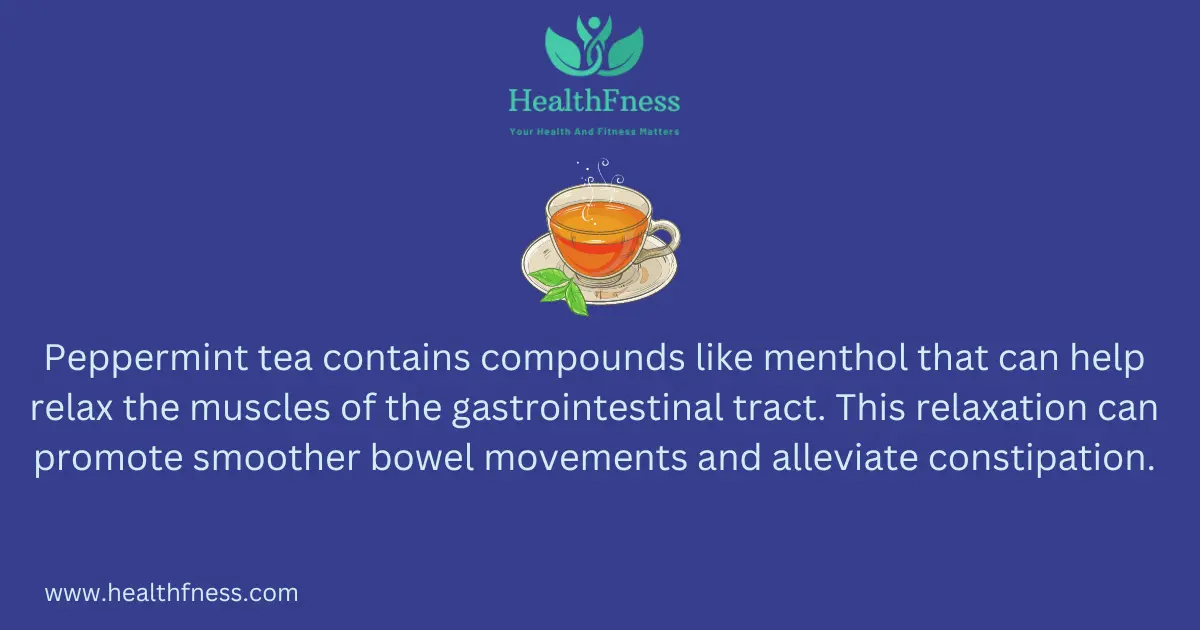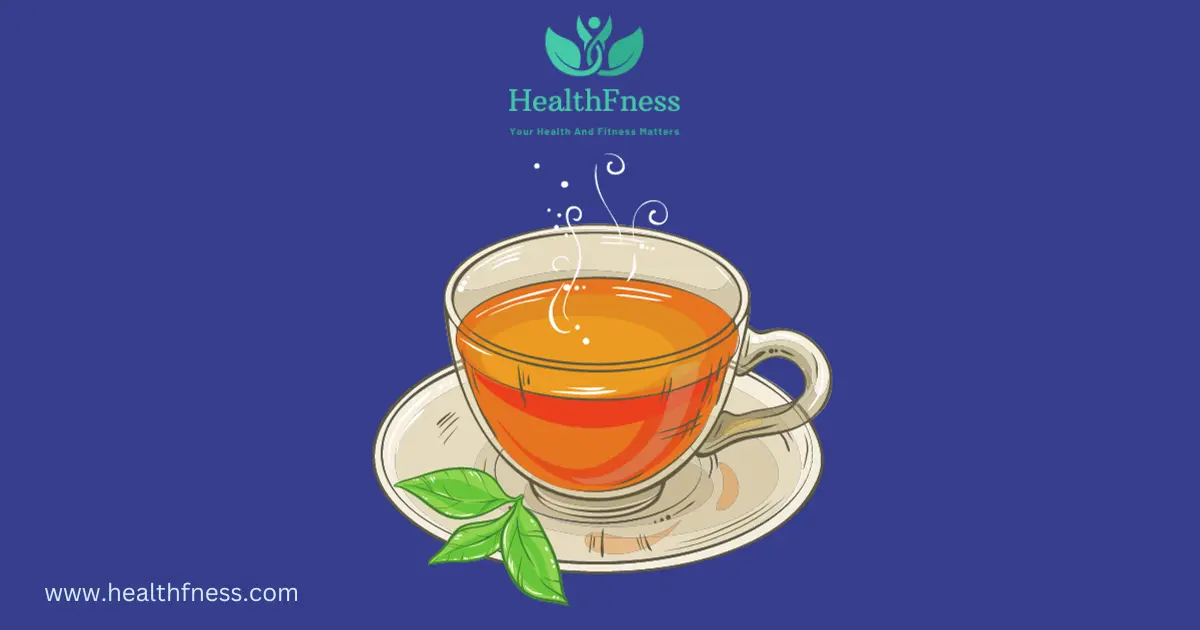Tired of feeling blocked up? Curious if a warm herbal tea could help. In this guide, we’ll explore how different herbal teas might ease your tummy troubles. From calming chamomile to powerful senna, we’ll find out which teas can help you go.
By the end, you’ll know all about what herbal tea is good for constipation? and how it might make constipation a thing of the past, giving you a more comfortable path forward.
So Let’s get started.😊
What Causes Constipation?
If you want to know the causes of constipation you can read this article.
What Herbal Tea is Good for Constipation?
Here are five herbal teas known for their potential to relieve constipation, along with guidance on how to prepare and enjoy them:
Peppermint Tea
- Benefits for Constipation: Peppermint tea can help relax the muscles of the digestive tract, promoting smoother bowel movements.
- How to Make: Steep 1 teaspoon of dried peppermint leaves in hot water for 5-10 minutes.
- When to Drink: Enjoy a cup after meals to aid digestion or when experiencing discomfort from constipation.

Ginger Tea
- Benefits for Constipation: Ginger tea can stimulate digestion and alleviate gastrointestinal discomfort, including constipation.
- How to Make: Boil 1-2 teaspoons of grated fresh ginger in water for 10-15 minutes, then strain.
- When to Drink: Drink ginger tea in the morning or before meals to support digestion.
Dandelion Tea
- Benefits for Constipation: Dandelion tea acts as a gentle laxative and diuretic, promoting bowel movements and reducing bloating.
- How to Make: Steep 1-2 teaspoons of dried dandelion root in hot water for 5-10 minutes.
- When to Drink: Enjoy dandelion tea in the afternoon or evening to aid digestion and relieve constipation.
Senna Tea
- Benefits for Constipation: Senna tea contains compounds called sennosides that have a powerful laxative effect, relieving constipation effectively.
- How to Make: Steep 1-2 senna tea bags in hot water for 5-10 minutes, according to package instructions.
- When to Drink: Senna tea is best consumed at bedtime for overnight relief from constipation.
Fennel Tea
- Benefits for Constipation: Fennel tea can help relax the digestive muscles and relieve gas, bloating, and constipation.
- How to Make: Crush 1-2 teaspoons of fennel seeds and steep in hot water for 5-10 minutes.
- When to Drink: Enjoy fennel tea after meals or whenever you feel digestive discomfort.
5 Herbal Remedies for Constipation
- Peppermint Tea: Opting for peppermint infusion is a soothing selection, renowned for its capacity to induce relaxation in digestive musculature and mitigate the discomfort of bloating, consequently facilitating smoother bowel movements.
- Senna Tea: Senna infusion stands as a potent natural laxative, effectively stimulating bowel motility and offering respite from constipation when employed judiciously.
- Dandelion Root Tea: Dandelion root elixir assumes the role of a mild yet efficacious laxative, actively contributing to the regularization of bowel movements, rendering it a valuable herbal remedy in the realm of constipation management.
- Licorice Root Tea: Licorice root brew, in addition to its stomach-soothing properties, proves instrumental in alleviating constipation, thereby positioning itself as a versatile herbal resource for digestive well-being.
- Fennel Tea: The reputation of fennel tisane precedes it, acknowledged for its prowess in reducing bloating and enhancing the digestive process, indirectly aiding in the amelioration of constipation by fostering overall gastrointestinal functionality.
How Do Herbal Teas Help Constipation?
Herbal infusions contribute to the alleviation of constipation by virtue of their inherent attributes that stimulate bowel motility and alleviate discomfort. These infusions frequently harbor compounds with gentle laxative properties, facilitating stool softening and the activation of the digestive mechanism.
Furthermore, herbal infusions play a role in maintaining adequate hydration, a pivotal component in preserving regularity within the digestive continuum. Certain botanicals also possess anti-inflammatory characteristics that can mitigate inflammation in the gastrointestinal tract, subsequently diminishing the manifestations of constipation. In summation, herbal infusions offer a soothing and efficacious avenue for addressing constipation while fortifying overall digestive well-being.
Risk Factors to Consider
Risk factors for constipation include dietary choices low in fiber and fluids, dehydration, lack of physical activity, certain medications, underlying medical conditions like IBS or diabetes, aging, pregnancy, stress, travel, neurological conditions, and hormonal changes. Recognizing these factors can aid in the prevention and management of constipation.
How Much Tea Should You Drink?
The ideal tea intake varies depending on factors like tea type, caffeine tolerance, and personal choices. Typically, 3-4 cups of caffeinated tea per day is moderate, while caffeine-free herbal teas can be consumed more liberally, around 3-6 cups daily.
Consider individual sensitivity, health goals, and specific circumstances like pregnancy or medical conditions. Prioritize staying hydrated with plain water, and explore different tea varieties for diverse flavors and potential health perks.
If Constipation Troubles You, Consider These Teas for Relief
When experiencing difficulty with bowel movements, certain teas like peppermint, senna, dandelion root, licorice root, and fennel can be beneficial in providing relief from constipation by addressing different aspects of digestive discomfort. Explore the scientific insights into constipation at PubMed↗, and discover the latest research in the field.
FAQS
What tea should I drink if I'm constipated?
Choosing the right tea depends on your preferences, but peppermint and senna tea are known for their constipation-relieving properties.
What can I drink to relieve constipation fast?
If you're looking for quick relief, senna tea is a potent choice, but remember to follow the recommended dosage.
What tea helps soften stools?
Fennel tea and psyllium husk tea can help soften stools, making them easier to pass.
What helps constipation fast naturally?
Natural remedies like herbal teas, increased water intake, and dietary fiber can help alleviate constipation.
Can we drink milk tea in constipation?
While milk tea may not directly relieve constipation, it can be a soothing beverage that complements other remedies.
Is chai tea good for constipation?
Chai tea, with its blend of spices, can aid digestion and potentially help with constipation.
Is yogurt good for constipation?
Yogurt is known for its probiotic content, which can promote gut health and aid in regular bowel movements.
How can I soften my stool?
Increasing dietary fiber, staying hydrated, and incorporating stool-softening herbs like psyllium can help.
Are dates good for constipation?
Dates are rich in fiber and can be a natural remedy for constipation when consumed in moderation.
What is the best fruit to relieve constipation?
Prunes are renowned for their effectiveness in relieving constipation due to their high fiber content.
Conclusion
- Peppermint, ginger, dandelion, senna, and fennel teas are among the herbal remedies known for their potential to ease constipation effectively.
- These teas can be enjoyed at various times throughout the day, depending on personal preference and digestive needs.
- Understanding the benefits of herbal teas for constipation management empowers individuals to make informed choices for their digestive health.
- Remember to consider risk factors for constipation and consult with a healthcare professional if you experience persistent symptoms or have underlying health conditions.

